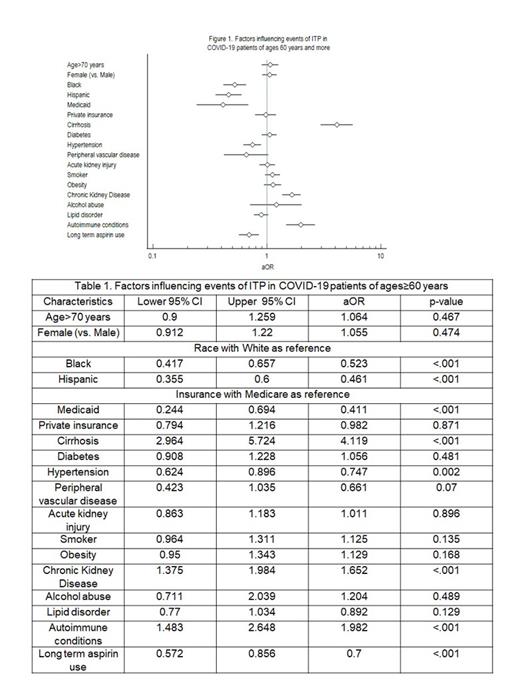Introduction: Immune thrombocytopenia (ITP) involves an autoimmune destruction of platelets secondary to factors such as lupus erythematosus or viral conditions, e.g., COVID-19. With the onset of the pandemic in 2020, several reports of ITP in COVID-19 patients were published. However, to date, very limited information exists on the factors influencing the odds of ITP among the elderly who were COVID-19-positive before the introduction of mass vaccination campaigns. Hereby, we seek to bridge the knowledge gap via an in-depth analysis of hospitalization records.
Methods: Our retrospective analysis via the 2020 National Inpatient Sample included admissions of patients ages≥60 years with a primary diagnosis of COVID-19. As the COVID-19 vaccination began on a large scale in December 2020 in the US and the ICD-10 code ‘U071‘ was introduced in April, we restricted our sample to admissions between April to November 2020 for better accuracy of results. Logistic regression models were used to estimate various patient characteristics that affected the odds of a diagnosis of ITP.
Results: Between 1st April 2020 and 30th November 2020, there were 507860 patients of 60 and more years hospitalized primarily for COVID-19. An estimated 830 cases developed ITP, with an incidence rate of 163 cases per 100,000 COVID-19-positive patients. Multiple comorbidities such as a history of autoimmune conditions (aOR 1.982, 95% CI 1.483-2.648, p<0.01), chronic kidney disease (aOR 1.652, 95% CI 1.375-1.984, p<0.01), and cirrhosis (aOR 4.119, 95% CI 2.964-5.724, p<0.01) showed higher odds of ITP. Racial disparities were also noted as compared to Whites, Blacks (aOR 0.523, 95% CI 0.417-0.657, p<0.01) and Hispanics (aOR 0.461, 95% CI 0.355-0.600, p<0.01) showed reduced odds. Furthermore, Medicaid insurers also had lower odds (aOR 0.411, 95% CI 0.244-0.694, p<0.01) than those insured by Medicare. Hypertension (aOR 0.747, 95% CI 0.624-0.894, p<0.01) and long-term aspirin use(aOR 0.700, 95% CI 0.572-0.856, p<0.01) also showed fewer events of ITP (Table 1, Figure 1). The mean Charlson Comorbidity Index (CCI) score was higher among those who had ITP (mean score of 4.20 vs. 3.08, p<0.01). Furthermore, patients with ITP also experienced a longer stay (12.29 days vs. 8.34 days, p<0.01). Events of ITP among the elderly with COVID-19 were linked with a poorer prognosis as 27.1% of all patients died (vs. 15.2% in the non-ITP group, aOR mortality 1.880, 95% CI 1.585-2.230, p<0.01).
Conclusion: Our results provide the first report of factors linked with the risk of ITP among the elderly with COVID-19. Various conditions such as autoimmunity and racial disparities have previously been reported to influence events of ITP, as also seen in our study. We further report higher odds among patients with cirrhosis and chronic kidney disease, while those with hypertension and long term aspirin use had lower odds. ITP also led to a higher mortality rate. Broader studies can help understand the impact of our findings during the pre-vaccination era, which can help set a template for protocols among the elderly in future pandemics.
Disclosures
No relevant conflicts of interest to declare.


